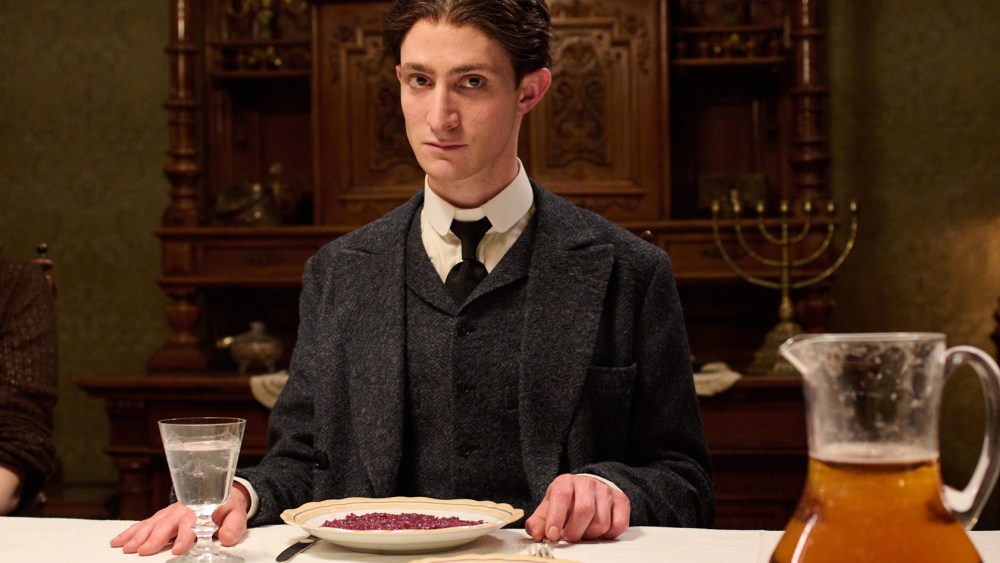As biopic subjects go, Franz Kafka is resistant to standard-issue treatment on a number of levels — beginning with the fact that his life, short and largely uncelebrated in its time, wasn’t especially remarkable. A humble civil servant from a middle-class Czech Jewish family in Prague, he published very little of his influential literary oeuvre prior to his untimely death from tuberculosis at the age of 40; while he was alive, his existence resembled that of many a frustrated, moonlighting writer stuck in an uninspiring day job. There’s also the matter of spiritual fidelity to the man and his work: For an artist associated with nightmarishly distorted reality and absurdism, a linear, glossily prestigious Wikimovie would amount to a kind of betrayal.
That’s not a charge you can level at veteran Polish filmmaker Agnieszka Holland. Her roving, restlessly shape-shifting portrait “Franz” certainly honors Kafka’s iconoclasm, if not really his literary sensibility: Awash with era-skipping anachronisms and rampant fourth-wall breakage, it’s too puckish, at times even winkingly so, for anyone to describe as Kafkaesque. That’s not in itself a problem, not least since Steven Soderbergh already took that approach in his own anti-biopic “Kafka,” a gorgeous curate’s egg that channeled thin strands of fact into a noir-streaked pastiche of the writer’s darkly paranoid fiction.
Only comparatively orthodox, Holland’s film includes cradle-to-grave biographical essentials, but fragmented into a rattling kaleidoscope structure that forges connections not just between Kafka’s childhood and his adult neuroses, but the targets of his socioeconomic commentary and our corporatized present.
Yet for all this fevered darting and pointing, “Franz” doesn’t have much of a point of view, nor much of an angle on Kafka beyond a general pronouncement of his enduring significance. Shot and designed with verve, Holland’s film has significantly more formal ideas than the average great-man biopic, seemingly trying a new stylistic tack every few minutes, between sundry crash zooms and blaringly disruptive soundtrack cues. Characters archly comment on proceedings directly to camera at some points and retreat into the staid distance of historical drama at others, as passages of seemingly earnest melodrama crash abruptly into broad-brush contemporary satire.
Intellectually, however, “Franz’s” ideas are thinner on the ground. The film’s portrayal of Kafka as a misunderstood genius stymied by bourgeois capitalist priorities is sympathetic but hardly radical, while its engagement with his actual work is limited, give or take some canny quotation in Marek Epstein’s script. (Elsewhere, Holland settles for blunt, jokey referencing, as when a cockroach is angrily flattened by Kafka’s father during a tense dinner table scene.) Only in one standout sequence, cross-cutting between an ill-received public reading of his short story “In the Penal Colony” and a dreamily macabre dramatization of its contents, does the film seem to fully tap its subject’s imagination.
Notwithstanding its elaborately disordered presentation, the film’s more straightforwardly biographical material contains few surprises. We skim through Kafka’s loveless upbringing by his brusque, business-minded father (Peter Kurth), his closer relationships with his mother (Sandra Korzeniak) and his especially devoted sister Ottla (Katharina Stark), his aborted engagement to working-class German woman Felice Bauer (Carol Schuler), his rash affair with her best friend Grete Bloch (Gesa Schermuly), and his repeated attempts to escape the drudgery of his insurance office job, whether via his writing or his failed attempt to join the army during the First World War.
Required to shore up most of the film’s disparate floating parts with his stoic, haunted presence, big-screen newcomer Idan Weiss brings some sense of fractured soul to proceedings — as well as a credible resemblance to Kafka himself, in line with the particular historical detailing that underpins Holland’s wilder flights of fancy. (He’s also, incidentally, a near dead ringer for French actor Pierre Niney, star of François Ozon’s wholly unrelated period piece “Frantz.”) Still, he can’t really animate scenes that, on their own terms, hew closer to Masterpiece Theater than the film’s more anarchic overall design, and border on repetitive wherever they’re placed in the whole. Kafka’s dysfunctional relationship with his father is consistent across decades, a point underlined by perhaps too many twinned vignettes of trauma rooting and roosting.
“Franz” is most interesting when it reaches outside its subject’s lifespan to bridge Kafka’s modest existence with our outsize impression of him today — ambitiously though not always successfully. A moving coda dramatizes the risks his friend and colleague Max Brod (Sebastian Schwarz) took to preserve and protect Kafka’s writings after his death, even through the rise of anti-intellectual fascism in the 1930s.
However, recurring cutaways to present-day tours at an exaggerated interpretation of Prague’s real-life Kafka Museum strike an odd note. There’s some wisdom in their depiction of how Kafka’s personal and creative struggles are vulnerable to romanticization by educators, curators and indeed by filmmakers, whether or not Holland counts herself in that bracket. But a sour straw-man swipe at a tourist industry packaging his name into literal “Kafka Burgers” feels off-base. It would be selling Holland’s artistry and curiosity short to suggest “Franz,” with its profusion of gimmicky liberties and historical name-checking, is a Kafka burger itself — but it’s at least something of a chopped Kafka salad.

